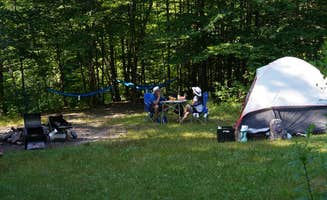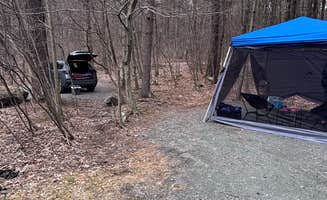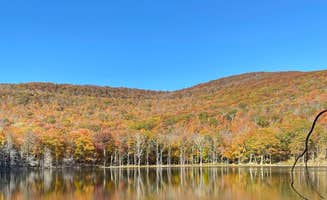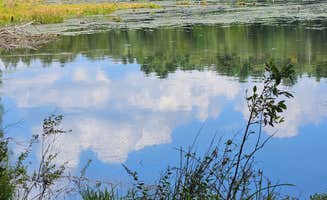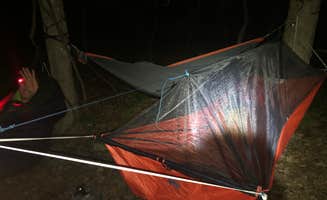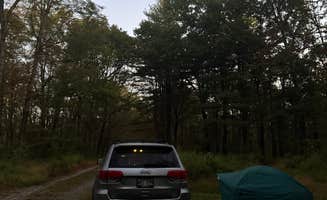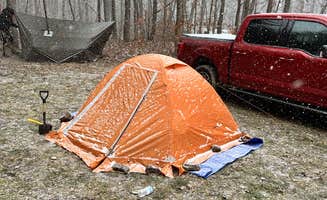Dispersed camping near Grahamsville, New York provides access to the western Catskill Mountains at elevations between 1,200 and 3,500 feet. The region receives approximately 45 inches of annual precipitation with summer temperatures averaging 70-80°F during peak camping season. Winter camping remains possible at lower elevations though forest roads typically close after significant snowfall.
What to do
Hiking to mountain peaks: From Denning Trailhead Peekamoose Primitive Camping, campers can access multiple summits. "Great camping spots about 1.5 mile hike in from Denning Trailhead. A lot of spots right by the river. Great spot to camp and then wake up to hike to tabletop/ peekamoose mountain," notes camper Ali B.
Wildlife observation: The forested areas provide habitat for deer, black bears, and numerous bird species. At Taconic Hereford Multiple Use Park, campers report excellent wildlife viewing opportunities. "There is plenty of trails to explore and wildlife to enjoy, especially since these over 900 acres also back up to another huge plot of protected forests," explains Doc B.
Winter camping: Several sites remain accessible during colder months for experienced winter campers. "Was a great location for winter camping. Site easily accessible from road. Beautiful, peaceful, great time!" reports Felix R. about Burnt Rossman State Forest's Westkill Camp. Winter campers should pack additional insulation and verify road conditions before departing.
What campers like
Lakeside sites: Water access consistently ranks high among visitor preferences. At Echo Lake, campers appreciate the shoreline setup. One visitor reports, "Lake is surrounded by hills and there is a small lean two with a few campfire spots. Other campsites are scattered and require navigating through small overgrown trails (wear pants)."
Solitude and privacy: Hemlock Ridge MUA Dispersed receives positive reviews for its isolation. "If you like dispersed camping, like me- this place is good. There are absolutely no amenities whatsoever & barely even a signal here, but it's quiet & off the beaten path," writes Dawn M. The parking area accommodates only 4-5 vehicles, limiting crowding.
Natural swimming spots: Several campsites feature natural swimming areas in summer months. Allaben Primitive Campsites includes a small pond, though as Breanne H. notes: "Small pond-don't think there are any fish. Picnic table. Fire pit with cooking griddle. Trails to the fishing access across the road."
What you should know
Vehicle requirements: Many primitive campsites require high-clearance vehicles. At Duck Pond Campsite, Yae U. cautions: "After driving unpaved dirt road for a while, we arrived a surprisingly well maintained beautiful campsites... Just be careful driving in the sometimes rough conditions."
Site availability fluctuations: Most dispersed camping areas operate without reservations and have limited capacity. At Hickok Brook, availability can be challenging on holidays. "It's Labor Day weekend, see how many people try to cram in to the very limited camping area," notes camper Gregg T.
Permit requirements: New York State lands may require camping permits, particularly during peak season. "Need a permit on NY state land. Contact Rangers office of whatever county," advises a Hickok Brook camper who had to relocate their site after ranger inspection.
Tips for camping with families
Consider accessibility: For families with young children, select sites with minimal hiking requirements. Burnt Rossman State Forest offers accessible options as The L. explains: "This spot is right off the road. Nice and quiet. There is enough room for 2 to 3 campers. Parking across the street if it's wet."
Pack insect protection: Bug activity can be significant at waterfront sites, particularly for children. At Echo Lake, one camper advises: "Note, it can get swampy near the edge of the lake so you may want to bring bug spray."
Water purification: No potable water exists at most sites, requiring families to carry sufficient drinking water or purification equipment. At Hickok Brook, campers must be self-sufficient: "Bring everything with you. It's a hike back to town... there is a small town 10 minutes away. Eldred, NY."
Tips from RVers
Size limitations: Most dispersed areas cannot accommodate larger recreational vehicles. At Hickok Brook, Corey found: "I drove in thinking that there would be flat places to park a very rugged camper in my full ton diesel pickup. The road is very rough with huge potholes so good clearance is a must. It's not a good spot for car camping."
Communication challenges: Cell coverage varies widely throughout the region, complicating navigation for RVs. Limited connectivity affects emergency communications and GPS functionality on forest roads.
Seasonal accessibility: Winter and early spring access becomes particularly difficult for RVs. Many forest roads remain unmaintained during snow season, with mud season typically extending from March through early May.


